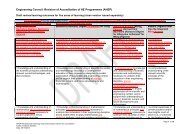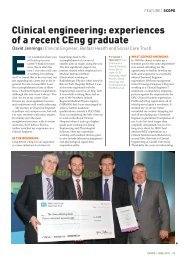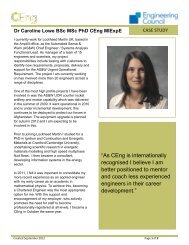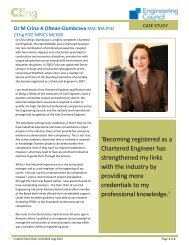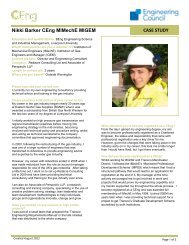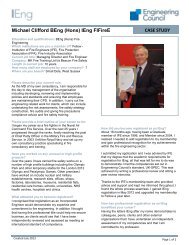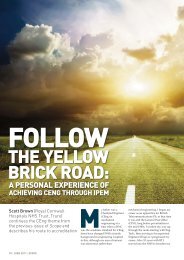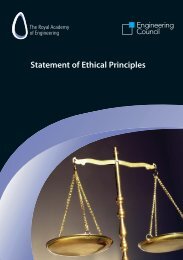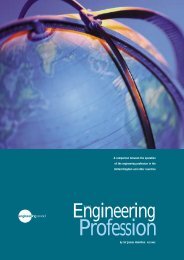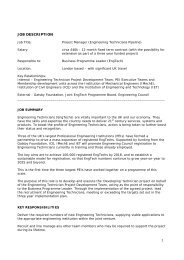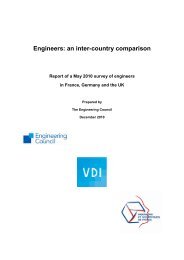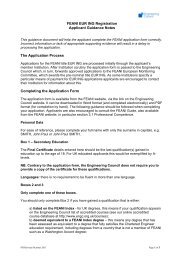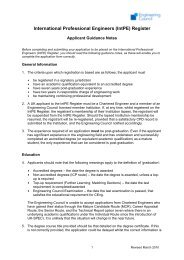An Engine for Change - A Chronicle of the Engineering Council
An Engine for Change - A Chronicle of the Engineering Council
An Engine for Change - A Chronicle of the Engineering Council
Create successful ePaper yourself
Turn your PDF publications into a flip-book with our unique Google optimized e-Paper software.
112A CHRONICLE OF THE ENGINEERING COUNCILJoint Venture Groups (JVGs)The EngC’s revised Royal Charter and Bye-Laws enabled Fairclough’s “New Relationship”to be <strong>for</strong>ged between <strong>the</strong> Institutions and <strong>the</strong> EngC. One aspect <strong>of</strong> this was <strong>the</strong> setting up in1996 <strong>of</strong> short-term Joint Venture Groups, each led by an identified Institution, to considerparticular national issues that were thought likely to challenge pr<strong>of</strong>essional engineers. Inkeeping with <strong>the</strong> Government’s Foresight programme that had been launched in 1994 tovisualise and address <strong>the</strong> implications <strong>of</strong> a number <strong>of</strong> issues to <strong>the</strong> year 2020, <strong>the</strong> EngC’sJoint Venture exercise attracted <strong>the</strong> title ‘20/20 Vision Programme’. The topics chosen were<strong>the</strong> environment (led by IChemE), energy (led by IMechE), communications (led by IEE) andtransport (led by ICE). All Institutions were invited to participate but inter-Institutionalrivalry soon reared its head once more, <strong>the</strong> Institute <strong>of</strong> Energy, <strong>for</strong> example, claiming that itshould have led <strong>the</strong> energy group, although in reality <strong>the</strong> larger Institutions had broaderfinancial bases to be able to support this activity.The first <strong>An</strong>nual Conference <strong>of</strong> <strong>the</strong> re<strong>for</strong>med <strong>Engine</strong>ering <strong>Council</strong> was held in September1996 at Church House, Westminster. Delegates and representatives from industry were told<strong>of</strong> <strong>the</strong> proposals that 1997 was to be designated <strong>the</strong> Year <strong>of</strong> <strong>Engine</strong>ering Success (YES).Preliminary reports were also presented by two <strong>of</strong> <strong>the</strong> 20/20 Vision Programme Joint VentureStudy group leaders – Pr<strong>of</strong>essor Tony Ridley (ICE) on transport, and Pr<strong>of</strong>essor ErnestShannon (IMechE) on energy. Reports on <strong>the</strong> Environment and Communications topic werenot available until <strong>the</strong> 1997 Conference.Interfacing with GovernmentAlthough <strong>the</strong> new <strong>Engine</strong>ering <strong>Council</strong> was now establishing a good relationship withGovernment during 1996 and was beginning to be recognised as <strong>the</strong> “Voice <strong>of</strong> <strong>the</strong><strong>Engine</strong>ering Pr<strong>of</strong>ession”, <strong>the</strong>re were complications. The unification activities, as alreadyindicated, had seriously reduced <strong>the</strong> EngC’s financial resources and a General Election waslooming in <strong>the</strong> following Spring, diverting Ministers’ attentions. Never<strong>the</strong>less, a vitallyimportant agreement in <strong>the</strong> <strong>for</strong>m <strong>of</strong> a Memorandum <strong>of</strong> Understanding (MOU) was developedduring <strong>the</strong> year (and signed in March 1997) between <strong>the</strong> EngC and <strong>the</strong> ConservativeGovernment. This pr<strong>of</strong>ound agreement recognised <strong>the</strong> EngC as <strong>the</strong> UK body to represent <strong>the</strong>engineering pr<strong>of</strong>ession [significantly, a re-statement <strong>of</strong> <strong>the</strong> supplemental Royal Charter], andalso committed, but did not legally bind, <strong>the</strong> Government and <strong>the</strong> EngC to jointly maintain anational work<strong>for</strong>ce <strong>of</strong> pr<strong>of</strong>essionally qualified engineers. The MOU also pledged <strong>the</strong>Government to look to <strong>the</strong> EngC to “<strong>of</strong>fer advice on national issues such as education,training, industrial competitiveness, risk, <strong>the</strong> environment… where engineering is a majorfactor.” The Memorandum was made available on <strong>the</strong> EngC’s website in <strong>the</strong> Autumn <strong>of</strong>1997. The MOU was so all-embracing that we quote it in full in <strong>An</strong>nex G.Coming hard on <strong>the</strong> heels <strong>of</strong> <strong>the</strong> results <strong>of</strong> <strong>the</strong> Fairclough Initiative, an unambiguous MOU <strong>of</strong>such range and depth (that was subsequently endorsed by <strong>the</strong> Labour Government after <strong>the</strong>1997 election), presented a great opportunity. This should have put <strong>the</strong> EngC on course <strong>for</strong> anorder-<strong>of</strong>-magnitude change in activity and regard. Un<strong>for</strong>tunately <strong>the</strong> MOU does not appear tohave been exploited to even half <strong>of</strong> its full potential. In particular it could have opened <strong>the</strong>way to <strong>the</strong> EngC being <strong>the</strong> “principal representative <strong>of</strong> <strong>the</strong> engineering pr<strong>of</strong>ession in dealingswith <strong>the</strong> Government…” (Article 4(b) and (c)). There was, indeed, a certain amount <strong>of</strong>increased contact with Government - some <strong>Council</strong> Members met with <strong>the</strong> Prime Minister at<strong>the</strong> annual Labour Party Conference in 1998 when a number <strong>of</strong> issues were discussed and© <strong>Engine</strong>ering <strong>Council</strong> UK 2004



